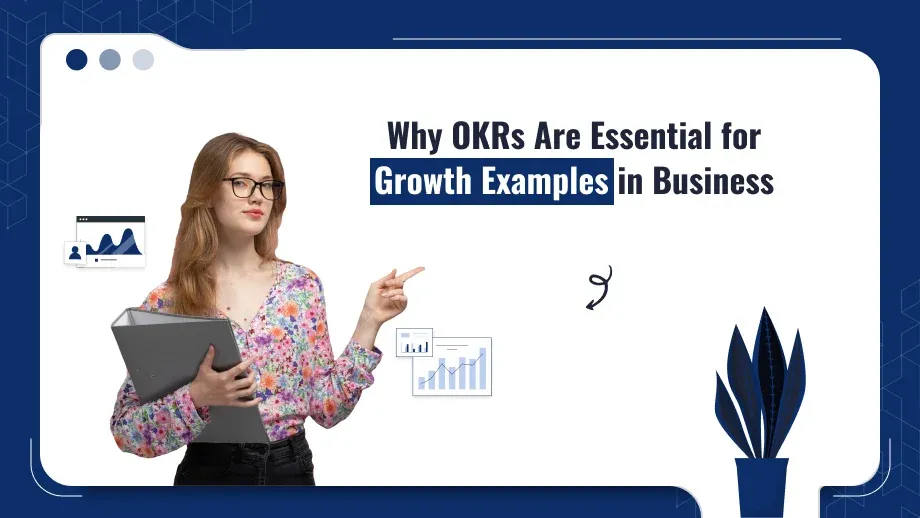
When you want to drive significant progress within your business, simply having vague goals won’t cut it. That’s where Growth OKRs (Objectives and Key Results) come in. They provide measurable ways to achieve ambitious targets and offer clear growth examples for tracking progress.
For instance, if your objective is to increase revenue, the key results might track milestones like improving profit margins or closing more deals. This guide’ll explore practical growth examples across various areas and how OKRs can lead the way.
Revenue Growth Examples for Indian Businesses
For businesses in India, setting up clear Growth OKRs can help drive revenue by giving teams measurable targets. Here’s how you can approach this:
- Objective: Increase annual revenue by 20%.
Key Results:
- Boost gross profit margins from 30% to 40% within six months.
- Close deals worth ₹10 crore within the next two quarters by expanding into new markets.
- Increase the average deal size by 15% by offering bundled services or products tailored to client needs.
These examples focus on practical Growth examples, leveraging India’s growing market opportunities, and aligning your business goals with measurable outcomes.
Why This Matters:
In a competitive environment like India, setting revenue goals tied to specific outcomes ensures that every team member understands their contribution to growth. Improving deal sizes through strategic pricing or tailored packages can significantly impact revenue. Additionally, expanding into emerging markets and tapping into regional opportunities gives businesses in India a chance to grow faster.
Sales Growth OKRs for Indian Businesses
Sales teams play a crucial role in driving business growth. Here’s how you can apply Growth OKRs to improve sales processes and outcomes in the Indian market:
- Objective: Improve sales team performance and revenue generation.
Key Results:
- Increase the sales pipeline conversion rate by 20% over the next quarter.
- Achieve ₹5 crore in net-new sales within six months by expanding outreach to Tier 2 and Tier 3 cities.
- Boost repeat business by 25% through customer loyalty programs.
Why This Matters:
India’s diverse market presents unique opportunities. Expanding into smaller cities allows businesses to tap into underserved areas, while improving customer retention ensures long-term growth. By focusing on pipeline conversion rates, companies can identify and eliminate bottlenecks in the sales process, leading to higher revenues.
Boost your HR impact with practical Growth Examples.
Explore performance-management tool now!
Digital Marketing Growth OKRs for Indian Businesses
With digital platforms rapidly growing in India, it’s crucial to set Growth OKRs that focus on expanding your business’s online presence and driving conversions.
- Objective: Expand digital reach and customer engagement.
Key Results:
- Grow your website’s organic traffic by 25% through SEO optimization targeting local keywords.
- Increase LinkedIn and Instagram followers by 10K over the next quarter by running targeted campaigns.
- Boost website conversion rate from 2% to 5% by improving landing pages and offering region-specific content.
Why This Matters:
India’s digital market is booming, and brands that focus on creating engaging, localized content see significant returns. By growing your social media following and optimizing for local searches, businesses can capture a larger share of the online market. Tailored content not only attracts new customers but also enhances user experience, leading to higher conversion rates.
Operations Growth OKRs for Indian Businesses
Operational efficiency is essential for scaling businesses in India. Here are some Growth OKRs tailored to improve processes and performance:
- Objective: Enhance operational efficiency and reduce costs.
Key Results:
- Reduce production line changeover time by 20% through improved workflow automation within six months.
- Decrease operational costs by 15% by optimizing vendor management and sourcing local materials.
- Increase first-pass yield from 85% to 95% by improving quality control processes.
Why This Matters:
Efficient operations lead to reduced costs and better product quality, both of which are critical in a competitive market like India. By focusing on automation and local sourcing, businesses can achieve sustainable growth while maintaining profitability.
Employee Development Growth OKRs for Indian Businesses
Investing in employee development is key to long-term growth. Here’s how you can structure OKRs around this area:
- Objective: Strengthen employee skills and leadership capabilities.
Key Results:
- Implement company-wide training programs to upskill 70% of employees within the next quarter.
- Increase the internal promotion rate by 25% through targeted leadership development initiatives.
- Boost employee satisfaction scores from 70% to 85% by offering personalized career growth plans.
Why This Matters:
In India’s competitive talent market, focusing on employee growth ensures better retention, higher productivity, and strong leadership pipelines. Companies that invest in their teams see higher long-term returns and employee loyalty.
Leadership Development and Strategic Growth Example
Building strong leaders is crucial for driving growth across all functions. Here’s how to structure OKRs for leadership development in Indian businesses:
- Objective: Develop future leaders within the organization.
Key Results:
- Increase leadership training program participation by 50% within the next six months.
- Achieve 40% of leadership roles filled internally through promotions.
- Reduce leadership skill gaps by 30% based on post-training assessments.
Why This Matters:
Developing leadership skills not only strengthens internal capabilities but also ensures that the company can scale effectively while maintaining a clear strategic vision. Promoting from within increases morale and reduces turnover.
Conclusion
OKRs provide a structured approach to business growth, making it easier to set clear objectives and track measurable results. From revenue growth to employee development, these growth examples offer practical ways to align your teams and operations with ambitious goals. By setting targeted OKRs, businesses can expand their market presence, improve operational efficiency, and nurture talent, ensuring long-term success.
Let’s now wrap up with some FAQs to address common questions businesses might have when implementing OKRs.






